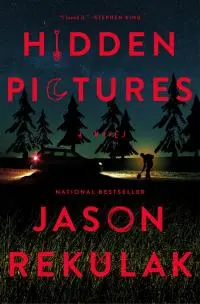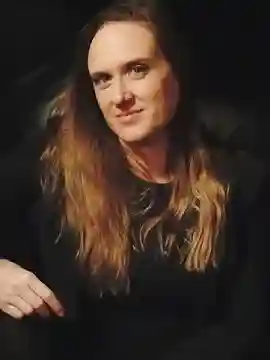Author photo by Courtney Apple
Jason Rekulak is no stranger to out of the box ideas. As editor of Quirk Books, he has successfully merged the unexpected into the mainstream time and time again. So, it should come as no surprise that his second novel, Hidden Pictures, does the same. Inside is a horror story about a recovering addict trying to save a little boy from a ghost. But the unexpected comes in the drawings and how effectively they work to maximize the creepy factor to a terrifying degree. It was so haunting that readers voted it the Goodreads Best Horror Novel of 2022. I was delighted to sit down and talk with Jason about creative storytelling, his writing process, and what a ghost might draw to scare him.
When did you start writing?
I always wanted to write. It was the only thing I was ever really interested in. I have this vivid memory of my friend taking me down to his basement one day and it was filled with pads of paper of all different sizes, shapes, and colors. He asked me if I wanted to take any, and I remember having this very strong urge that I wanted to take these blank pads and fill them with content. So, I started making these comics and selling them in the cafeteria in 5th grade.
Later, I worked at St. Martin’s briefly before I moved to Philadelphia, which gave me a little traditional publishing experience. And I was always writing at night.
What is your writing process like?
I’m still figuring my process out, but I do have a much better handle on it than I did ten years ago. One thing I do is I try to write as much by hand as I can. There’s something about the delay, because I have to write slower, so it forces me to choose everything more carefully. And it’s a little inefficient because I still have to type it up after I write it. So, that’s something I’ll do in the afternoon because I do like knowing how many words I have, how many pages I have, which you can’t get when you hand write. I typically don’t have a daily word count goal, but I will try to finish writing scenes.
For me, it’s about putting in the time. As long as I sat at my desk for four hours, I feel like I did it. And not every day will be great. I’ve rarely had weeks where all five days were great. But I’ve had weeks where four days were really good. That’s a good week.
Your book is structured very uniquely for an adult horror book, with children’s drawings and other artwork woven in. How did that come about?
I had some experience with out of the box, conceptual ideas from my time with Quirk Books, and based on my success there, I knew that if I did something with Will and Doogie, that they were so talented, their half of the book would be great. They were friends of mine, and I had always wanted to collaborate with them. I asked them if they wanted to write a mystery, and they said absolutely. But I had no idea what the story was.
I did know that I wanted the illustrations to be throughout the book, and I thought it would be cool if they changed. I wanted one of the characters to be creating them, so they weren’t decorative, and I wanted them to be from the world of the book with clues inside them. Because of my time in publishing, I knew that no one was going to print a full color novel, so the drawings had to done in pencil, or pen, or maybe a black crayon.
Even though I didn’t know the story, I knew the form, and having that structure made it actually really easy to write. So, then I spent three months figuring out how to fill in the story that fit all the parameters. Once I landed on the idea of a five-year-old boy drawing spooky pictures, it ticked all my boxes. From there the rest of the plot fell into place.
What does a typical writing day look like for you?
My daughter has to leave the house around 7:30 in the morning for school, so I’m up early. Once she’s out the door, I’m ready to go. I try to get out of the house because I find being home with pets and the doorbell ringing with packages is distracting. I try to get away from all that. So, I’ll go to the library or the coffee shop. I’ll write from around 8:30 to noon or one. And then in the afternoon, I’ll edit, or catch up on writing related tasks like emails.
Since you first started as an editor, do you find it difficult to balance drafting and editing when it comes to your own work?
I think sometimes I do let my internal editor have too much control too early. But the best thing I ever did as a result of working as an editor is learning to work from an outline. I used to start with a premise or idea that I found interesting, and I’d follow it until I hit a dead end. For years that was how I approached writing, and I feel like I wasted so much time.
I think I had the idea that this was the creative way to write. I thought, that’s what a true writer does. And if I made an outline, I wasn’t being creative. I was being formulaic. That was wrong. I learned as an editor that the most compelling pitches were stories that had a clear beginning, middle, and end with a story arc filled with twists and surprises. Because we were accepting conceptually commissioned books, I’d have to pitch and tell the story in less than a minute. I quickly saw the benefits of having the beats laid out and outlined. It’s still a very creative process. And it’s much easier to look at problems in an outline than in a three-hundred page manuscript.
Once I have the outline, the thing I tell myself is don’t stop. I have to keep moving forward. It’s so easy for me to sit back and say this is stupid, or no one is going to believe this. I question the decisions I made. I constantly have to fight it and remind myself that this is normal, everyone has doubt, but I can’t listen to it right now. I have to trust the decisions I made and follow them to the end. It’s hard to know when to leave the editor out of it and when it’s the right time to invite them in the room.
 If you were being haunted by a ghost, what would your artwork look like?
If you were being haunted by a ghost, what would your artwork look like?
I don’t like bugs. So, it would probably be pictures of bugs. They’re really creepy, all of them. I live in an old house, so they’re all over. Fortunately, I have two cats who are very active and predatory. So, I don’t see that many bugs. They usually get them before I do.
What advice would you give to aspiring or new writers?
When I first started writing, I remember thinking nothing interesting has ever happened to me. How could I possibly write something interesting? It wasn’t until I got older that I realized how limited my view of my own experience was. I had blinders on. But as I aged, I began to see certain things about my own experiences that I could draw into fiction.
I think we are all interesting, and have stories and experiences that can be easy to underestimate the value of. But the truth is, nobody has a story quite like you. I think writers should give themselves more credit. Everyone is interesting. Remember that.
What book should writers read?
It’s a boring answer, but I’d recommend at The Elements of Style by Strunk and White. When I worked as a publisher, all the editors had it. It’s really short but so great. It breaks down the elements of writing into specifics: this is why certain things sound better than other things, what is passive voice and when it can be effective, things like that.
For writers who read a lot, a lot of these things you’ll already know intuitively. But it will remind you of things that you might have forgot. It makes you more confident in everything you’re doing. It’s not really aimed at fiction, but because it’s about writing clearly and simply by putting the right words in order, I think it’s definitely worth a read.
What are you working on now? What’s next?
I probably shouldn’t talk about it much. It’s still early and it will invariably change. I think it will feel like Hidden Pictures in the sense that the same person wrote it, but it’s a different kind of story. My interests are pretty eclectic, so while it’s another thriller, it won’t be exactly the same. Hopefully, my audience will enjoy it just as much.
Get Hidden Pictures at Bookshop or Amazon

About the author
Jena Brown grew up playing make-believe in the Nevada desert, where her love for skeletons and harsh landscapes solidified. In addition to freelance writing, Jena blogs at www.jenabrownwrites.com. When she isn’t imagining deadly worlds, she and her husband keep busy being bossed around the Las Vegas desert by their two chihuahuas.








